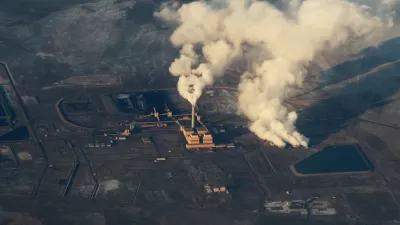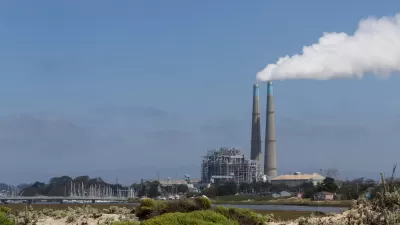The "War on Coal" is back, in the form of a new grassroots political campaign bankrolled by Bloomberg Philanthropies to decarbonize power generation by targeting existing coal power plants and halting the growth of natural gas replacements.
"Michael R. Bloomberg, the former mayor of New York City, said on Friday [June 7] he would donate $500 million to a new campaign to close every coal-fired power plant in the United States and halt the growth of natural gas," reports Lisa Friedman, who focuses on climate and environmental policy in Washington for The New York Times.
The new campaign, called Beyond Carbon, is designed to help eliminate coal by focusing on state and local governments. The effort will bypass Washington, where Mr. Bloomberg has said national action appears unlikely because of a divided Congress and a president who denies the established science of climate change.
“We’re in a race against time with climate change, and yet there is virtually no hope of bold federal action on this issue for at least another two years,” Mr. Bloomberg said in a statement before the announcement, which he made in a commencement address at the Massachusetts Institute of Technology.
David L. Chandler of the MIT News Office captured some of the many highlights of Bloomberg's 22-minute commencement address (see video and transcript) to the Class of 2019:
“The challenge that lies before you — stopping climate change — is unlike any other ever faced by humankind,” Bloomberg said. “The stakes could not be higher."
And finally, because climate change is currently a political problem, not a scientific or technological one, Bloomberg said, the initiative will be engaged in elections across the country. “At least for the foreseeable future, winning the battle against climate change will depend less on scientific advancement and more on political activism. … Our message to elected officials will be simple: Face reality on climate change, or face the music on election day,” he said.
"A spokesman for Mr. Bloomberg said most of the money would be spent over the next three years, though the time frame could be extended," adds Friedman.
It will fund lobbying efforts by environmental groups — in state legislatures, City Councils and public utility commissions — that aim to close coal plants and replace them with wind, solar and other renewable power. Part of the cash also will go toward efforts to elect local lawmakers who prioritize clean energy.
War on coal revival?
The campaign in some ways is reminiscent of how the coal industry and their Republican allies in Congress framed a major part of former President Obama's climate initiative, calling it a "war on coal," particularly the Clean Power Plan rule which would have addressed carbon emissions from existing power plants. The rule was struck down by the U.S. Supreme Court in June 2014. The Trump administration initiated the effort to repeal it in 2017, proposing a far more lax plan known as the Affordable Clean Energy Rule last August.
As Bloomberg stated in his MIT commencement address, it will largely be a political campaign, patterned on the "Beyond Coal" campaign he launched with the Sierra Club in July 2011 with a $50 million donation with the goal of closing at least a third of the country’s coal plants. Friedman notes that "Bloomberg has already donated more than $150 million to the Sierra Club and other environmental organizations" as part of the Beyond Coal campaign.
"With 289 of 530 closed to date – more than half the country’s coal fleet – Beyond Carbon will aim to close the rest [241] by 2030 and stop the rush to build new gas plants," according to Bloomberg Philanthropies.
We will employ the same advocacy, legal, and electoral strategies that have proven so successful in retiring coal-fired power plants – which we have continued to close at the same fast rate under this administration as we did under the previous one – and also in passing gun safety background check laws in states around the country.
To be sure, the primary reason for coal power plant shuttering is not attributed to political advocacy but market forces, notes Friedman, especially to "inexpensive natural gas and the falling costs of wind, solar and other renewables," which brings up the second and likely more challenging component of Beyond Carbon.
Natural gas component
"Ensuring that natural gas does not fill the energy void left by coal will be an even trickier proposition," adds Friedman.
While the leading Democratic candidates agree that fighting climate change should be a priority for the country, [and] Gov. Jay Inslee of Washington, who has made climate change the centerpiece of his presidential campaign, has called for the total elimination of the United States coal fleet by 2030, none has called for limits on the expansion of natural gas. [See Friedman's April 18 piece with Maggie Astor on the climate change positions of 18 declared Democratic candidates.]
The "bridge fuel" debate about natural gas, "[t]he idea is that it should be used to reduce dependence on dirtier energy like coal and heating oil on an interim basis while the costs of renewables like wind and solar fall," writes Friedman, is one of the most interesting parts of her piece.
Karen Harbert, president of the American Gas Association, an industry group, called Mr. Bloomberg’s plan a “beyond energy” campaign.
Here's what Bloomberg told MIT's Class of 2019 on Friday:
Second, we will work to stop the construction of new gas plants. By the time they are built, they will already be out of date – because renewable energy will be cheaper. [...] We don't want to replace one fossil fuel with another. We want to build a clean energy economy...
Mary Anne Hitt, director of the Sierra Club Beyond Coal Campaign, agrees. "We also need to stop the rush to build the 150 new fracked gas power plants that are on the drawing board and accelerate the shift to 100% clean energy," she wrote in her blog on the new partnership with Bloomberg Philanthropies, in which she also noted that the Club's current campaign recognizes the importance of coal workers and coal-based communities.
We need to move entirely beyond coal in the next decade and do so in a way that supports an economic transition for communities and workers that leaves no one behind.
FULL STORY: Michael Bloomberg Promises $500 Million to Help End Coal

Planetizen Federal Action Tracker
A weekly monitor of how Trump’s orders and actions are impacting planners and planning in America.

Maui's Vacation Rental Debate Turns Ugly
Verbal attacks, misinformation campaigns and fistfights plague a high-stakes debate to convert thousands of vacation rentals into long-term housing.

Restaurant Patios Were a Pandemic Win — Why Were They so Hard to Keep?
Social distancing requirements and changes in travel patterns prompted cities to pilot new uses for street and sidewalk space. Then it got complicated.

In California Battle of Housing vs. Environment, Housing Just Won
A new state law significantly limits the power of CEQA, an environmental review law that served as a powerful tool for blocking new development.

Boulder Eliminates Parking Minimums Citywide
Officials estimate the cost of building a single underground parking space at up to $100,000.

Orange County, Florida Adopts Largest US “Sprawl Repair” Code
The ‘Orange Code’ seeks to rectify decades of sprawl-inducing, car-oriented development.
Urban Design for Planners 1: Software Tools
This six-course series explores essential urban design concepts using open source software and equips planners with the tools they need to participate fully in the urban design process.
Planning for Universal Design
Learn the tools for implementing Universal Design in planning regulations.
Heyer Gruel & Associates PA
JM Goldson LLC
Custer County Colorado
City of Camden Redevelopment Agency
City of Astoria
Transportation Research & Education Center (TREC) at Portland State University
Jefferson Parish Government
Camden Redevelopment Agency
City of Claremont





























